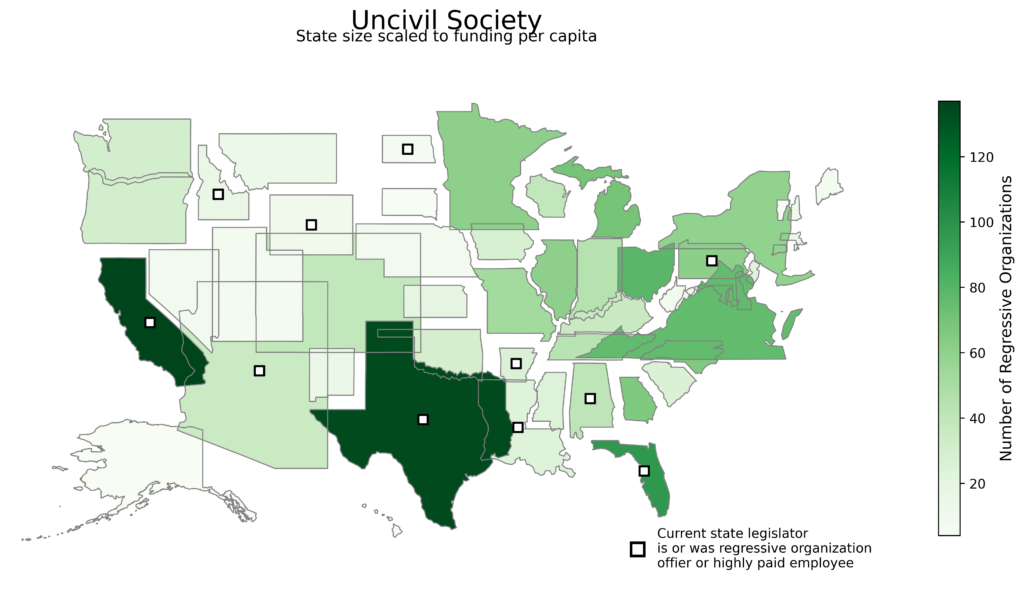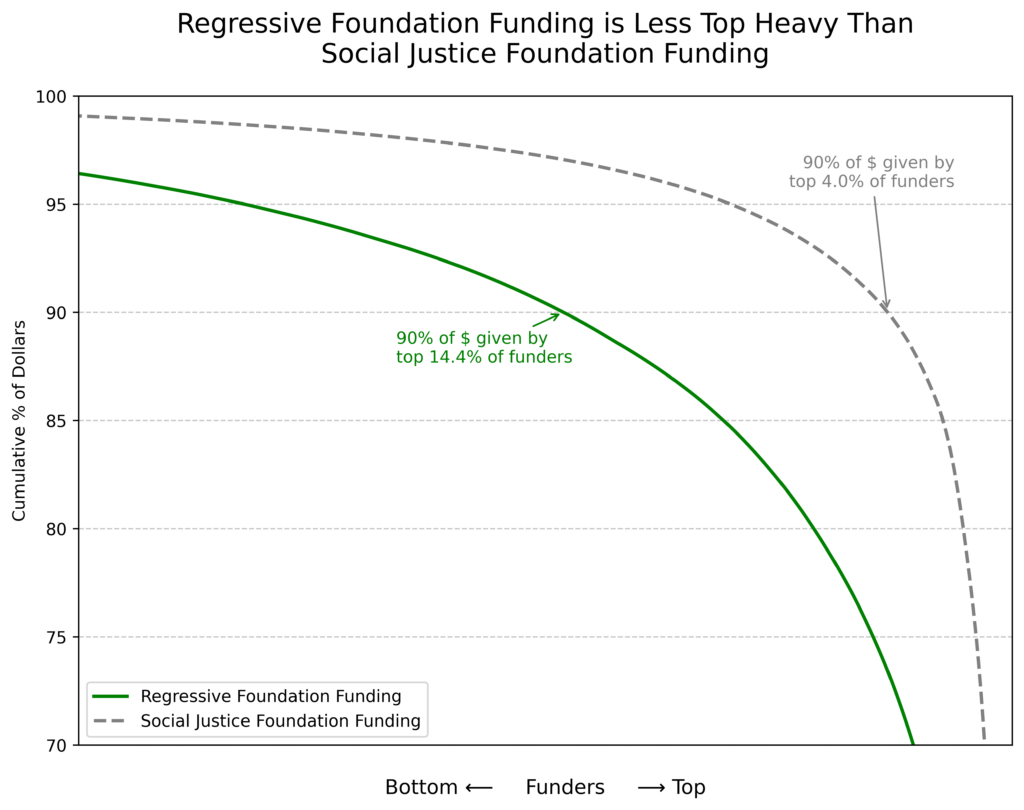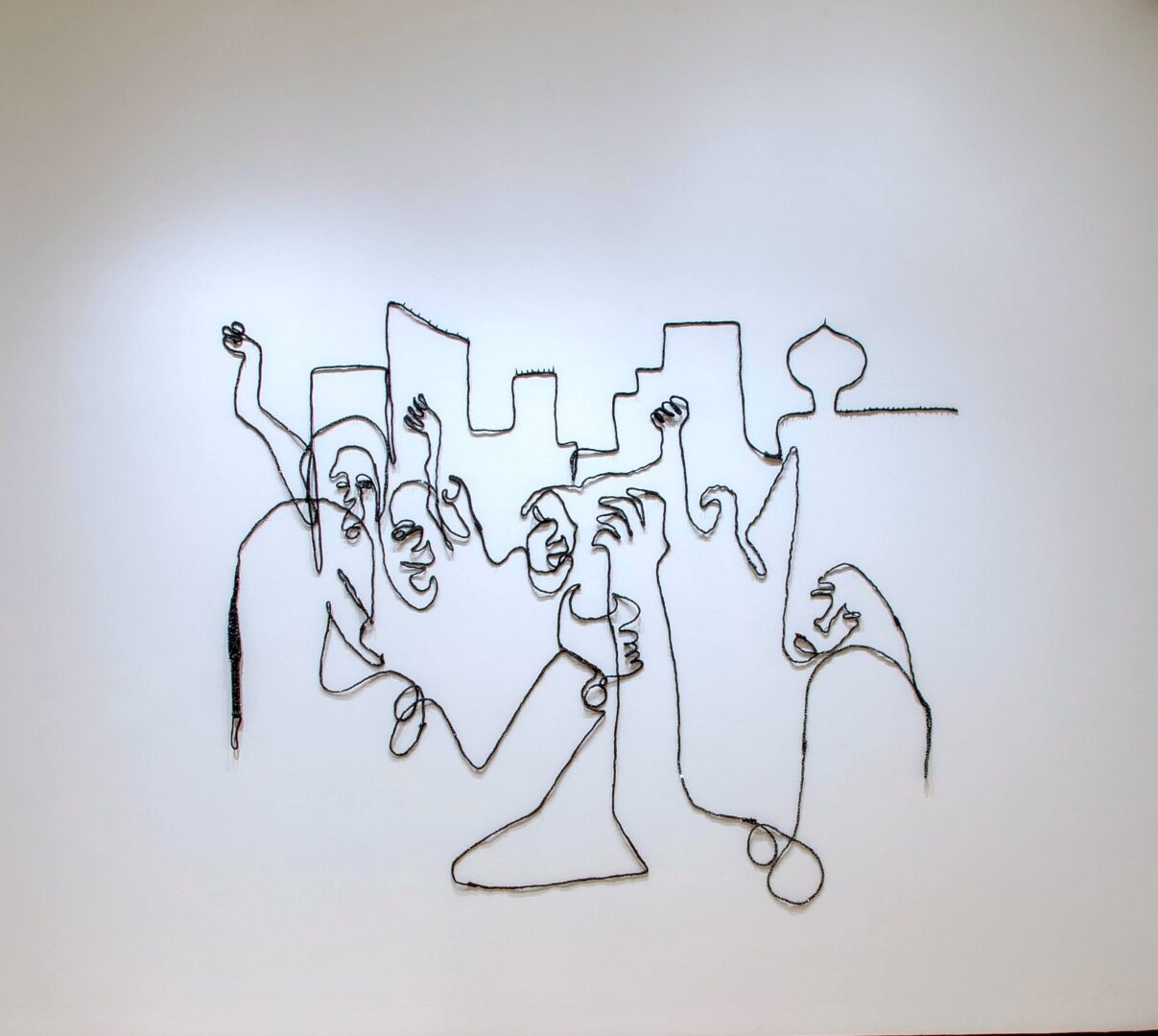“In no country in the world has the principle of association been more successfully used, or more unsparingly applied to a multitude of different objects, than in America.” – Alexis de Tocqueville, 1835
The quote above is from a 19th century French bureaucrat who turned a treatise on the early USA’s supposedly exemplary prison system into an explanation of the unlikely, especially from the standpoint of the chaos of 19th century France, success of America’s relatively representative democracy. His theories developed into the vacillating but prescient “Democracy in America.” Civil society in the United States has never been hegemonically liberal or universalist. It has, since the early republic, contained in it currents of well-funded and well-organized illiberal, even violent, collective action. In 2025, we at NCRP see this clearly taking shape in our research into increasingly authoritarian civil society, not made by accident but rather by long-term, strategic funding by deep-pocketed foundations all over the country.
Regressive Philanthropy
Using tax filing data and policy advocacy keywords, NCRP has identified over 1,800 non-profit organizations in 50 states and Washington, D.C. that reported more than 30,000 staff and 655,000 volunteers. These organizations are working diligently to undermine the civil and human rights of immigrants, LGBTQ+ people, and women and pregnant people – hard won in the century since the fall of Jim Crow. To many of their wealthiest patrons, these organizations are part of a multi-pronged strategy to transform American democracy into something more autocratic and illiberal – although not at all un-American.

As part of our effort to better understand the donor ecosystems behind these non-profits, NCRP developed a set of linked data processing and analysis scripts in Python using IRS Form 990 data structured and published by Giving Tuesday. More than 1,300 regressive organizations – voluntary associations whose activities are permitted by current 501(c)3 limits but whose goal is to roll back human and civil rights protections won in the US’s post-1965 multi-racial democracy – have filed 990 forms since 2021.
NCRP research found a network of 9,996 foundations sent $3.6 billion to support 1,836 regressive organizations since 2010. 90 percent of all foundation funding for these regressive organizations came from the 15 percent of foundations (around 1,500) that gave more than $500,000 since 2010, and more than one-third came from 10 large donor-advised fund (DAF) sponsors.
While many organizations led for and by marginalized people are collecting donor-restricted project grants, a majority (52 percent) of regressive organizations received at least 90 percent of their foundation support as general operating support.
Half of the regressive organizations NCRP has tracked so far had at least 1 funder relationship that lasted more than 6 years, and more than 1 in 4 had at least 1 funder relationship that lasted 10 years or more. Those organizations with at least 1 decade-long funder relationship received more than 75 percent of all regressive foundation funding. The nearly $500 million per year foundations gave to these regressive organizations is enough to cover a whole year of their travel, legal, advertising, office, and occupancy costs, or half of the year’s entire staffing costs.
Between 2010 and 2022, these 1,836 regressive organizations listed more than 34,000 individual organizational officers, which includes officers and highly paid employees (OHPE). The top-compensated 1 percent (about 340 OHPE) alone took home nearly half (48 percent) of all reported officer compensation – each receiving more than $1 million individually over the period.
To examine the overlap between political power and nonprofit leadership, NCRP researchers matched standardized OHPE names against a national dataset of state legislator names and district information. We used both exact and fuzzy name matching algorithms filtered by state for geographic relevance. Out of more than 34,000 non-profit officers and over 7,000 state legislators algorithmically assessed, manual validation confirmed 13 current state legislators in 11 states who have served or are serving as officers at organizations aligned with anti-human rights agendas.

Democracy in America
Distraught by the turmoil around him in post-Revolution France, de Tocqueville observed that “the unrestrained liberty of political association” in the infant United States had “not hitherto produced those fatal consequences which might perhaps be expected from it elsewhere.” He attributed this quiescence in American civil society to the political culture’s lack of minoritarian factions “diametrically opposed to the majority” and to what he called “Universal Suffrage.”
Of course, we know that de Tocqueville, who was himself European nobility, wrote at a time when most people living in the United States – defined either by its borders then or now – could not vote or exercise their other constitutional rights without fear of violent state or private repression. In “Democracy in America,” de Tocqueville expresses a shockingly cold (even for its time) view of the contemporaneous forced removal and effective genocide of Indigenous people in the United States and near its borders. And not all associating followed de Tocqueville’s model, where the liberty of association allowed the “moral authority of the minority” to protect against the “tyranny of the majority.” In the 1830s, one of the country’s most prominent voluntary associations was the African Colonization Society, founded by white clergy, business leaders, and even slave owners to solve the “problem” of race-mixing in communities with growing population of free Black people. As Nicholas Guyatt, a lecturer in American history at Cambridge University, has put it in his account of the Society’s founding, “[In December 1816] dozens of the nation’s most powerful men met in the Davis Hotel in Washington to plot the removal of African Americans from the United States.”
Moral reform organizations flourished in 19th century United States, in what Stuart Blumin, emeritus professor of American history at Cornell University, calls “an era of voluntary institutional innovation without parallel in American history.” By the end of the 1800s, temperance leagues with anti-Black and anti-Catholic politics had proliferated, and avowedly nativist associations like the American Protective Association and the Immigration Restriction League were objecting loudly and sometimes violently to a changing America.
By the 1920s, one of the country’s largest voluntary associations was a reincarnated, newly nationalized Ku Klux Klan, with deep ties to the anti-immigrant moral reformers in the Anti-Saloon League and thousands of Christian churches. Throughout the association’s history, it mobilized volunteers, paid staff, and built community in nearly every state around objecting to the voting rights of its neighbors, enforcing the patriarchy and prohibition, and preserving the country’s white demographic majority with a campaign that included eugenics, intimidation, violence, and banal policymaking. 1924’s Immigration Act was the culmination of decades of anti-immigrant policy change stretching back to the Chinese Exclusion Act. liberty” of association in the USA has, throughout the country’s history, led to sometimes counterintuitively illiberal coalitions capable of building and wielding power to change policy.
A Century of Associations
The speaker pro tempore of the Florida House of Representatives was a trustee at a local anti-abortion center before he was elected in 2018, and since then has sponsored 2 bills, both of which became law, limiting civilian oversight of police. The 5th most conservative Texas House of Representatives member, according to the “Texas Tribune,” is a 37-year-old who was on the board of a local anti-abortion center for 5 years before he was elected. During his sophomore legislative session in 2023, he personally advocated for and won $80 million in funding for anti-abortion centers in the state budget. The director of development for anti-LGBTQ advocacy group Family Research Council won a Wyoming Senate seat in 2024 and co-sponsored all 5 of the anti-trans bills that became law in that state this year as well as bills that have not yet become law, such as bills prohibiting electronic voting machines, sanctuary cities, and DEI trainings and promoting conspiracy theories about non-citizen voting and chemical abortion medicines polluting water supplies. Altogether these 12 legislators are responsible for sponsoring, co-sponsoring, or authoring at least 50 bills restricting the civil and human rights of immigrants, pregnant people, and queer people – at least a dozen of which have become law.
The erosion of our shared democratic, republican values in the last decade and more – impossible to ignore now in the midst of a hostile takeover of the federal government by race- and gender-obsessed fanatics – is the result of the labor of many donors and organizers across the country. Hundreds of grasstops and grassroots organizations can rely on the trust – and dollars – of thousands of institutional donors who operate under the shelter of the tax exemption, subsidized by us all. There is much we still don’t know about this universe of nativist, patriarchal, and reactionary donors, but tax filings make clear they are deeply invested in the longstanding American tradition of transforming our communities through a robust civil society, though not always for the betterment of all.
Ryan Schlegel is Director of Research at NCRP where he leads the organization’s analysis of Form 990 data. He has written on the ideas driving a new generation of techno-philanthropists, the philanthropic landscape for progressive social change in the U.S. South, and the challenges facing civil society in an age of rising extremism. Ryan studied government and politics at the University of Maryland, College Park. He is an Ohioan living in Virginia.
*Data visual image credit – Katherine Ponce, NCRP

